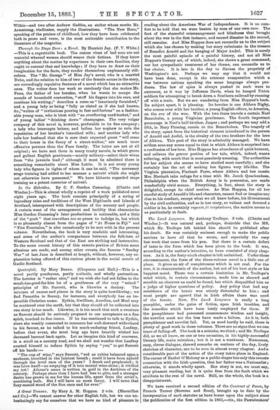The Land Leaguers. By Anthony Trollope. 3 vols. (Chatto and
Windns.)—It was natural and, perhaps, desirable that the MS. which Mr. Trollope left behind him should be published after his death. He was certainly eminent enough to make the public anxious to have all that he wrote, and especially the very last work that came from hie pen. Bat there is a certain defect of taste in the form which has been given to the book. It was, according to the author's intention, to have consisted of sixty chap- ters. As it is, the forty-ninth chapter is left unfinished. Under these circumstances, the form of the three-volume novel is a little out of place. It gives an air of completeness which is not real. For the rest, it is characteristic of the author, but not of his best style or hie happiest mood. There was a certain limitation in Mr. Trollope's mind which, in certain circumstances, made him as shrewd and sensible an observer as could be found, but which disqualified him as a judge of higher questions of policy. Any policy that had any semblance of the heroic was utterly distasteful to him ; and most people are agreed that in Irish affairs there was need of the heroic. Now, The Land Leaguers is really a long pamphlet, under the guise of fiction, upon Irish troubles, and the remedies which have been lately employed for thorn. If the pamphleteer had possessed consummate wisdom and insight, the novelist must not the less have made a failure. As it is, both pamphleteer and novelist fail. Yet, as need hardly be said, there is plenty of good work in these volumes. There are no signs that we can trace of falling-off. The book is a mistake, we think ; and Mr. Trollope did, as we all know, on one or two occasions, in his highly-successful literary life, make mistakes ; but it is not a weakness. Humorous, easy, clever dialogue, shrewd remarks on matters of the day, lively sketches of character, are to be seen in almost every chapter. And a considerable part of the action of the story takes place in England. The career of Rachel O'Mahony as a public singer has only this remote connection with the Irish question, that her father was a Nationalist ; otherwise, it stands wholly apart. Her story is not, we must say, very pleasant reading, but it is quite free from the fault which we attribute to the rest of the novel. Still, on the whole, the book is a disappointment.










































 Previous page
Previous page